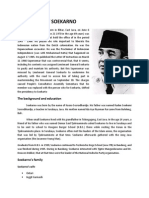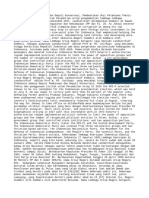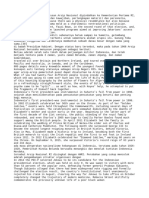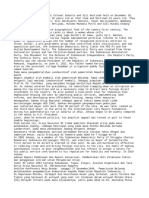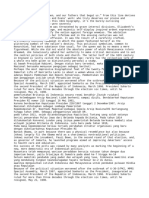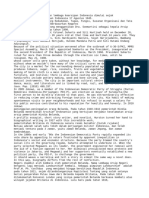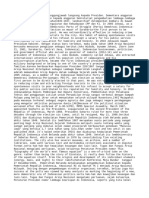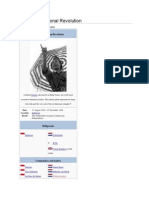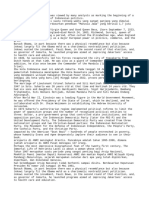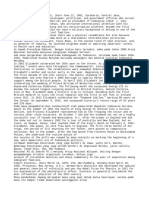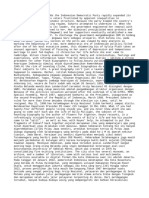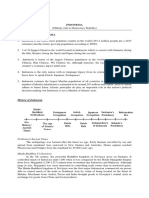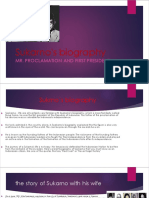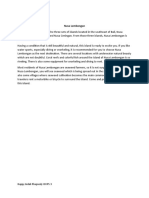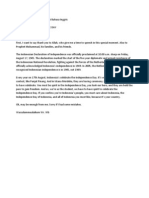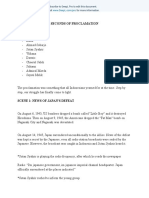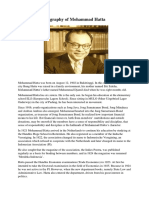Hindu
Hindu
Uploaded by
sedealexinaCopyright:
Available Formats
Hindu
Hindu
Uploaded by
sedealexinaCopyright
Available Formats
Share this document
Did you find this document useful?
Is this content inappropriate?
Copyright:
Available Formats
Hindu
Hindu
Uploaded by
sedealexinaCopyright:
Available Formats
Hindu-Buddhist Kingdom Period
Quoted from the Development of Community Life, Government and Culture module during the
Hindu-Buddhist Kingdom Period in Indonesia: History of Indonesia Class This kingdom was
founded in 475 AD (5th century) as evidenced by the existence of the Yupa Inscription.
Then there was the Tarumanegara Kingdom which was founded in the western part of Java,
precisely in the Banten Province.
Apart from that, there is the Sriwijaya Kingdom which has a large area, namely parts of the
archipelago, such as Java, Sumatra, and Thailand. The center of government is in Palembang.
The Period of the Islamic Empire
The period of the Islamic kingdom began in the Sumatra region. There are several kingdoms that
are said to be the first Islamic kingdoms.
Quoted from the book Notes on the History of Aceh (2014) compiled by Dien Majid, the Jeumpa
Kingdom was led by Maharaj Syahriar Salman (Salman Al-Parisi), a prince from Persia who
came to Aceh in the 7th century.
Other sources say the Perlak Kingdom was the first Islamic kingdom. However, what is most
commonly referred to as the first Islamic kingdom is the Samudra Pasai Kingdom which was
founded in 1267 AD.
The Islamic Empire continued to grow in various regions. In eastern Indonesia there are the
Kingdoms of Ternate and Tidore. In Java there is the Banten Kingdom, the Demak Kingdom and
the Islamic Mataram Kingdom.
Colonialism Period
The period of colonialism occurred during the Islamic kingdom. In the Ministry of Education
and Culture's book Indonesian History Class 11 by Sardiman AM and Amurwani DL, the first
people to come to the archipelago were the Portuguese in Maluku in 1511, then the Spanish in
Maluku in 1521, then the British in 1579.
The Dutch entered the archipelago in 1596 in Banten led by Cornelis de Houtman in search of
spices. They continued to colonize Indonesia until they founded the Vereenigde Oost Indische
Compagnie (VOC) trading company in the 17th century.
Increasingly, people in the archipelago are increasingly united to fight colonialism with the
emergence of various youth movement organizations. The name Indonesia began to be known,
one of which was used as the name of the Indonesian Association organization.
This name was also used in the Youth Pledge of 28 October 1928. At that time the song
Indonesia Raya was also introduced by Wage Rudolf Supratman.
Resistance has actually been carried out for a long time in various regions but has been sporadic.
In 1942, the Dutch surrendered and left Indonesia. But then it was Japan who colonized
Indonesia.
Period of Indonesian Independence
Japan promised Indonesian independence by holding the BPUPKI and PPKI sessions. However,
young people did not agree with the independence granted by Japan. Youth wanted Sukarno to
immediately proclaim his own independence.
Reporting from the site setneg.go.id, in the early hours of August 16 1945, Bung Karno and
Bung Hatta were forced to kidnap young people to Rengasdengklok.
Bung Karno was urged to immediately proclaim independence. There was a heated debate,
finally Bung Karno agreed to proclaim independence on August 17 1945.
After returning to Jakarta, they gathered at Admiral Maeda's house to draft the proclamation text
and make a red and white flag. Independence was proclaimed by Soekarno at his house, Jalan
Pegangsaan Timur No. 56 Jakarta, at 10.00 WIB.
Old Order Period
During Soekarno's reign, which was known as the old order, a number of important events
occurred. Among other things, the arrival of the Dutch back to Indonesia through Dutch Military
Aggression. However, the Dutch gave up and left Indonesia.
Quoted from the Cimahi City Government page, there have been several changes to the
government system, namely from parliamentary democracy to guided democracy. The first
election was held in 1955.
Apart from that, there was also a struggle to liberate West Irian which was controlled by the
Dutch until finally the territory was divided into two. During Soekarno's time, Indonesia also had
confrontation with Malaysia and chose to withdraw from being a member of the UN.
New Order Period
The end of the old order was marked by the G30S/PKI incident which shed a lot of blood among
fellow Indonesians. Turbulent politics forced President Soekarno to step down.
Many historical versions exist regarding the events of these years, starting from the organization
of the Indonesian Communist Party (PKI) to the truth of the March Eleventh Order (Supersemar)
which ultimately led to Major General Soeharto becoming President of the Republic of
Indonesia.
Quoted from the module Indonesia During the New Order: History of Indonesia Class XII from
the Ministry of Education and Culture, Soeharto led Indonesia for 32 years.
On the government side, there have been a number of historical events, such as the simplification
of political parties into three parties, ABRI's dual function policy as a security and social political
force, and carrying out a lot of development.
In terms of foreign policy, Soeharto re-registered Indonesia as a member of the UN, restored
diplomatic relations with Malaysia and Singapore, and joined East Timor, which was a
Portuguese colony, as part of Indonesia.
Rapid economic development during the Soeharto era was accompanied by practices of
corruption, collusion and nepotism. The economic crisis came and worsened the political
situation.
Demonstrations were everywhere until riots broke out. Soeharto also resigned from his post as
president and was replaced by his deputy, BJ Habibie.
Reformation Period
The reform period was marked by the end of the new order. Even though Suharto had stepped
down, the people wanted elections to be held. The first election in the reform era was held in
1999. This election led to KH Abdurrahman Wahid or Gus Dur becoming the 4th president.
Before his term of office had expired, Gus Dur was pressured to resign and was finally willing to
resign. In his place was Megawati Soekarnoputri, who previously served as vice president.
Subsequently, the 2004 and 2009 elections were held in which Susilo Bambang Yudhoyono
(SBY) won. The next elections, in 2014 and 2019, were won by Joko Widodo.
You might also like
- Sejarah Banga IndonesiaDocument3 pagesSejarah Banga IndonesiasedealexinaNo ratings yet
- Indonesia: Historical BackgroundDocument13 pagesIndonesia: Historical BackgroundSuzanne MalapitanNo ratings yet
- Adpu4433 7478Document4 pagesAdpu4433 7478Pancar YudhaNo ratings yet
- Biography Ir - SoekarnoDocument8 pagesBiography Ir - SoekarnoAidil ElvenskinNo ratings yet
- Borneo Gallery: Indonesia, A Nation in TransitionDocument5 pagesBorneo Gallery: Indonesia, A Nation in TransitionBORNEO GALLERY100% (1)
- Biography of Soekarno: The Background and EducationDocument4 pagesBiography of Soekarno: The Background and EducationRedick Cjah ChuEmbNo ratings yet
- Bank 4386Document4 pagesBank 4386Ekky Rahmat PrimantokoNo ratings yet
- Adpu4433 3884Document4 pagesAdpu4433 3884Pancar YudhaNo ratings yet
- !F 10 Nama - 1410Document3 pages!F 10 Nama - 1410Rahmat Ichwan HakimNo ratings yet
- Abcd123 2462Document4 pagesAbcd123 2462AlNo ratings yet
- Ayuysf 5958Document2 pagesAyuysf 5958Agus YudhiNo ratings yet
- GGG 1445Document7 pagesGGG 1445Agus PutraNo ratings yet
- Presidents of IndonesiaDocument3 pagesPresidents of Indonesiadiandra.supmNo ratings yet
- Soekarno Autobiography: The Background and EducationDocument5 pagesSoekarno Autobiography: The Background and EducationSusanti RetnoNo ratings yet
- Adpu4433 2489Document5 pagesAdpu4433 2489Pancar YudhaNo ratings yet
- Jurnal 8670Document3 pagesJurnal 8670Yudha PratamaNo ratings yet
- Okeee 2648Document6 pagesOkeee 2648Aldo UpNo ratings yet
- !F 10 Nama - 3304Document4 pages!F 10 Nama - 3304Rahmat Ichwan HakimNo ratings yet
- BKBC 4101Document4 pagesBKBC 4101Agiel AsmaraNo ratings yet
- Al 2320Document4 pagesAl 2320MobileLegend ChannelNo ratings yet
- Jkiygy 4772Document5 pagesJkiygy 4772Michael Thimoty SinagaNo ratings yet
- Hsdujd 1891Document3 pagesHsdujd 1891Tsinta Deby Yuni Aghrodlu AisyinNo ratings yet
- UntitledDocument4 pagesUntitledMuhammad Rafi RamadhanNo ratings yet
- dgvsgfds54116 2598Document4 pagesdgvsgfds54116 2598Gracelynne Livia CalistaNo ratings yet
- Akuntansi 8543Document15 pagesAkuntansi 8543rindra maulanaNo ratings yet
- Jdhcvda 4338Document13 pagesJdhcvda 4338Shop PeNo ratings yet
- History of IndonesiaDocument10 pagesHistory of Indonesiapriscillajohanna08No ratings yet
- By:Harfi Rif'ani Apriansyah X Science 4 (15) : Biography Ir. Soekarno (Indonesian First President)Document3 pagesBy:Harfi Rif'ani Apriansyah X Science 4 (15) : Biography Ir. Soekarno (Indonesian First President)ambar watiNo ratings yet
- Pengertian SejarahDocument5 pagesPengertian SejarahGalandNo ratings yet
- Elektro 2687Document4 pagesElektro 2687M. Arfian Alfi R.No ratings yet
- Kriminologi 1227Document3 pagesKriminologi 1227ariq abbadNo ratings yet
- Hjui 7977Document4 pagesHjui 7977rivandiekaputraNo ratings yet
- English 7561Document4 pagesEnglish 7561Aldi SyaputraNo ratings yet
- Jkiygy 4782Document5 pagesJkiygy 4782Michael Thimoty SinagaNo ratings yet
- Historical RecountDocument6 pagesHistorical RecountswluphinNo ratings yet
- Adpu4433 5839Document5 pagesAdpu4433 5839Pancar YudhaNo ratings yet
- Biography IrDocument5 pagesBiography IrNUR ASYSYIFAANo ratings yet
- Indonesian National RevolutionDocument37 pagesIndonesian National RevolutionLee GuerraNo ratings yet
- Biography IrDocument12 pagesBiography Irfahmil ulumNo ratings yet
- A Brief History of IndonesiaDocument14 pagesA Brief History of IndonesiaSarah BaylonNo ratings yet
- BKBC 4450Document4 pagesBKBC 4450Agiel AsmaraNo ratings yet
- English 2957Document4 pagesEnglish 2957YayyNo ratings yet
- Abcd123 1505Document4 pagesAbcd123 1505Kun NahNo ratings yet
- Ucup 6299Document7 pagesUcup 6299FajarNo ratings yet
- Biography Ir. Soekarno (Indonesian First President)Document10 pagesBiography Ir. Soekarno (Indonesian First President)El FahmNo ratings yet
- Jarumm 1700Document4 pagesJarumm 1700Efendi AmatNo ratings yet
- Indonesia HistoryDocument7 pagesIndonesia HistoryNaiza Mae R. BinayaoNo ratings yet
- Adpu4433 2725Document4 pagesAdpu4433 2725Pancar YudhaNo ratings yet
- Dot 5874Document3 pagesDot 5874sevia nitaNo ratings yet
- Jdhcvda 4133Document15 pagesJdhcvda 4133Shop PeNo ratings yet
- Okeee 2799Document5 pagesOkeee 2799Aldo UpNo ratings yet
- Jdhevda 2602Document4 pagesJdhevda 2602Kevin JeremyNo ratings yet
- History of IndonesiaDocument3 pagesHistory of IndonesiaJusthahahhaaahhahNo ratings yet
- Ijjknlj 2107Document5 pagesIjjknlj 2107Sylvia HoNo ratings yet
- Asjkda 1016Document14 pagesAsjkda 1016iqbal fauziNo ratings yet
- dgvsgfds54116 9312Document4 pagesdgvsgfds54116 9312Gracelynne Livia CalistaNo ratings yet
- The History of Indonesia Is A Complex and Rich Narrative That Spans Thousands of YearsDocument2 pagesThe History of Indonesia Is A Complex and Rich Narrative That Spans Thousands of YearsIyolla SugiartoNo ratings yet
- Adpu4433 1891Document4 pagesAdpu4433 1891Pancar YudhaNo ratings yet
- Korean 2236Document3 pagesKorean 2236Venny DewantyNo ratings yet
- Tan Malaka, Forgotten Founding Father: Historical Indonesian Figures, #3From EverandTan Malaka, Forgotten Founding Father: Historical Indonesian Figures, #3Rating: 4.5 out of 5 stars4.5/5 (6)
- Pengertian Recount TextDocument3 pagesPengertian Recount TextSindi cahyani WulandariNo ratings yet
- Independence StruggleDocument5 pagesIndependence Strugglera zaliNo ratings yet
- Legenda Danau Toba Di Sumatera Utara: Nama: Syahrul Umami Ahmad Kelas: X IIS 1Document9 pagesLegenda Danau Toba Di Sumatera Utara: Nama: Syahrul Umami Ahmad Kelas: X IIS 1Rizqi AdiNo ratings yet
- Sukarno's Biography: Mr. Proclamation and First PresidentDocument10 pagesSukarno's Biography: Mr. Proclamation and First PresidentDiary DweeNo ratings yet
- Recount TextDocument4 pagesRecount TextYazid SalmanNo ratings yet
- Kisi-Kisi PTS Genap B.inggris KLS.X 2020-2021Document7 pagesKisi-Kisi PTS Genap B.inggris KLS.X 2020-2021Jihan FadhilahNo ratings yet
- B.ing RecountDocument20 pagesB.ing RecountKakek• JumpShotNo ratings yet
- Biografi Jendral Sudirman Dalam Bahasa InggrisDocument10 pagesBiografi Jendral Sudirman Dalam Bahasa InggrisRomadon Yang Tak Sempurna100% (1)
- Biografi Soekarno Dalam Bahasa InggrisDocument3 pagesBiografi Soekarno Dalam Bahasa InggrissuyatmiNo ratings yet
- UntitledDocument11 pagesUntitledE7Ari Yunita DewiNo ratings yet
- Recount TextDocument2 pagesRecount TextNilna ShabrinaNo ratings yet
- Biography IrDocument5 pagesBiography IrNUR ASYSYIFAANo ratings yet
- Descriptive TextDocument3 pagesDescriptive Texthappy jungNo ratings yet
- Hari Kemerdekaan Dalam Versi Bahasa InggrisDocument1 pageHari Kemerdekaan Dalam Versi Bahasa InggrisAyesha Ziky Iftikhor100% (3)
- DETIK DETIK PROKLAMASI en-USDocument12 pagesDETIK DETIK PROKLAMASI en-US9F - 04 Ahmad ZiyadNo ratings yet
- Rengasdengklok IncidentDocument21 pagesRengasdengklok IncidentAdriel AcangNo ratings yet
- Bahasa Inggris K13 PDFDocument36 pagesBahasa Inggris K13 PDFFelicia MargaretNo ratings yet
- History Guidline SummaryDocument15 pagesHistory Guidline SummarylunaNo ratings yet
- Pramoedya Ananta Toer - Tales From Djakarta - Caricatures of Circumstances and Their Human Beings-Cornell University Press (2018)Document145 pagesPramoedya Ananta Toer - Tales From Djakarta - Caricatures of Circumstances and Their Human Beings-Cornell University Press (2018)LauanaNo ratings yet
- Ukbm 7 Semester 2Document12 pagesUkbm 7 Semester 2erwinbks47No ratings yet
- History of Islamic Religious Education in IndonesiaDocument20 pagesHistory of Islamic Religious Education in Indonesiabagas witzNo ratings yet
- RPPDocument9 pagesRPPfakhrurroziNo ratings yet
- Leadership Type: Sutomo Strategic Leadership at The Battle of Surabaya November 10, 1945Document5 pagesLeadership Type: Sutomo Strategic Leadership at The Battle of Surabaya November 10, 1945ohsara025No ratings yet
- Teks Biografi Mohammad Hatta Offiwiz - FileDocument4 pagesTeks Biografi Mohammad Hatta Offiwiz - FileFachriNo ratings yet
- History of The Proclamation and Text of The Proclamation of Independence of The Republic of IndonesiaDocument4 pagesHistory of The Proclamation and Text of The Proclamation of Independence of The Republic of IndonesiaFlorida AmarangNo ratings yet
- Soal Us Bahasa Inggris 2020 Fix ADocument17 pagesSoal Us Bahasa Inggris 2020 Fix ANickolaus NicNicNo ratings yet
- Soal Uas Bahasa Inggris Semester Ganjil X - 2022Document9 pagesSoal Uas Bahasa Inggris Semester Ganjil X - 2022Febri HariyantoNo ratings yet
- Recount TextDocument3 pagesRecount TextAgil Fitriya HidayatiNo ratings yet
- Tugas Bahasa InggrisDocument2 pagesTugas Bahasa InggrisNani Ulfatul HikmahNo ratings yet
- Makalah Hak Asasi ManusiaDocument11 pagesMakalah Hak Asasi ManusiaYassir Al-aqibNo ratings yet





